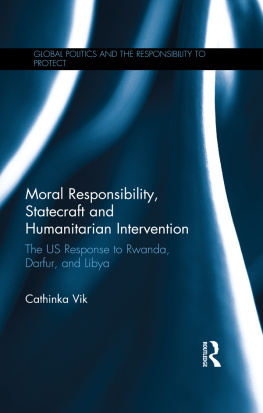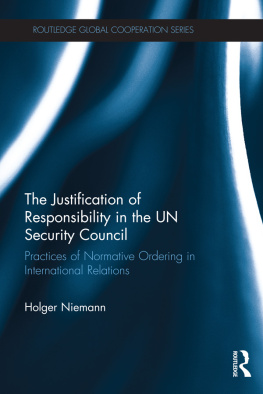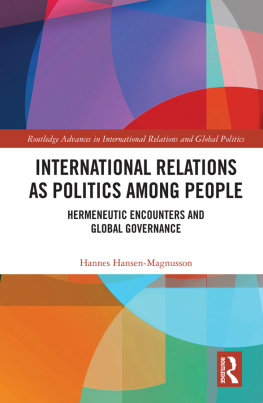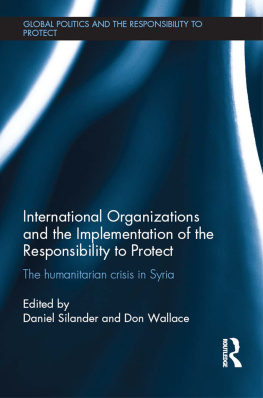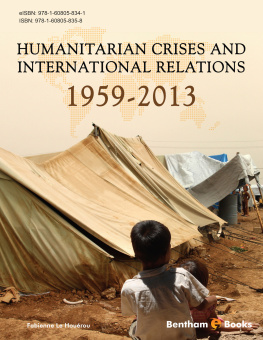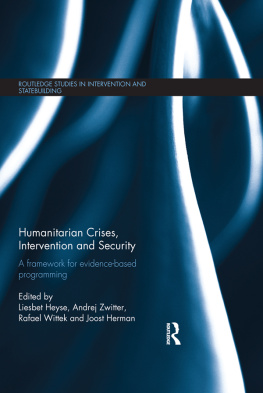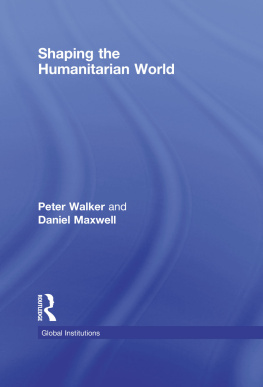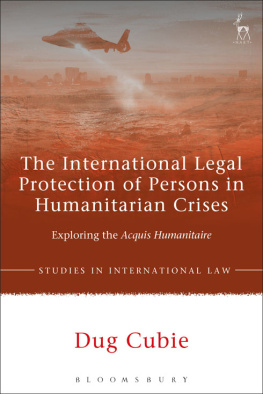Hannes Peltonen - International Responsibility and Grave Humanitarian Crises: Collective Provision for Human Security
Here you can read online Hannes Peltonen - International Responsibility and Grave Humanitarian Crises: Collective Provision for Human Security full text of the book (entire story) in english for free. Download pdf and epub, get meaning, cover and reviews about this ebook. year: 2012, publisher: Routledge, genre: Politics. Description of the work, (preface) as well as reviews are available. Best literature library LitArk.com created for fans of good reading and offers a wide selection of genres:
Romance novel
Science fiction
Adventure
Detective
Science
History
Home and family
Prose
Art
Politics
Computer
Non-fiction
Religion
Business
Children
Humor
Choose a favorite category and find really read worthwhile books. Enjoy immersion in the world of imagination, feel the emotions of the characters or learn something new for yourself, make an fascinating discovery.
- Book:International Responsibility and Grave Humanitarian Crises: Collective Provision for Human Security
- Author:
- Publisher:Routledge
- Genre:
- Year:2012
- Rating:3 / 5
- Favourites:Add to favourites
- Your mark:
- 60
- 1
- 2
- 3
- 4
- 5
International Responsibility and Grave Humanitarian Crises: Collective Provision for Human Security: summary, description and annotation
We offer to read an annotation, description, summary or preface (depends on what the author of the book "International Responsibility and Grave Humanitarian Crises: Collective Provision for Human Security" wrote himself). If you haven't found the necessary information about the book — write in the comments, we will try to find it.
Hannes Peltonen: author's other books
Who wrote International Responsibility and Grave Humanitarian Crises: Collective Provision for Human Security? Find out the surname, the name of the author of the book and a list of all author's works by series.
International Responsibility and Grave Humanitarian Crises: Collective Provision for Human Security — read online for free the complete book (whole text) full work
Below is the text of the book, divided by pages. System saving the place of the last page read, allows you to conveniently read the book "International Responsibility and Grave Humanitarian Crises: Collective Provision for Human Security" online for free, without having to search again every time where you left off. Put a bookmark, and you can go to the page where you finished reading at any time.
Font size:
Interval:
Bookmark:
Alex J. Bellamy
Griffith University
Sara E. Davies
Griffith University
and
Monica Serrano
The City University of New York
From Words to Deeds
Alex J. Bellamy
Norms, Laws and International Politics
Ramesh Thakur
Security and Human Rights
Cristina G. Badescu
Politics, Ethnicity, Genocide
Damien Kingsbury
Collective Provision for Human Security
Hannes Peltonen
by Routledge
2 Park Square, Milton Park, Abingdon, Oxon OX14 4RN
by Routledge
711 Third Avenue, New York, NY 10017
A catalogue record for this book is available from the British Library
Peltonen, Hannes, 1978
International responsibility and grave humanitarian crises : collective
provision for human security / Hannes Peltonen.
Includes bibliographical references and index.
1. Humanitarian intervention. 2. Intervention (International law)
3. Security, International. I. Title.
JZ6369.P44 2013
363.34526dc23
ISBN: 978-0-203-09376-4 (ebk)
by Wearset Ltd, Boldon, Tyne and Wear
| CC | Communal Contribution model |
| DPRK | Democratic Peoples Republic of Korea |
| EU | European Union |
| HI | humanitarian intervention |
| ICC | International Criminal Court |
| ICISS | International Commission on Intervention and State Sovereignty |
| ICJ | International Court of Justice |
| NATO | North Atlantic Treaty Organization |
| NPT | Treaty on the Non-Proliferation of Nuclear Weapons |
| R2P | responsibility to protect |
| UN | United Nations |
| UNGA | United Nations General Assembly |
| WTO | World Trade Organization |
Font size:
Interval:
Bookmark:
Similar books «International Responsibility and Grave Humanitarian Crises: Collective Provision for Human Security»
Look at similar books to International Responsibility and Grave Humanitarian Crises: Collective Provision for Human Security. We have selected literature similar in name and meaning in the hope of providing readers with more options to find new, interesting, not yet read works.
Discussion, reviews of the book International Responsibility and Grave Humanitarian Crises: Collective Provision for Human Security and just readers' own opinions. Leave your comments, write what you think about the work, its meaning or the main characters. Specify what exactly you liked and what you didn't like, and why you think so.





